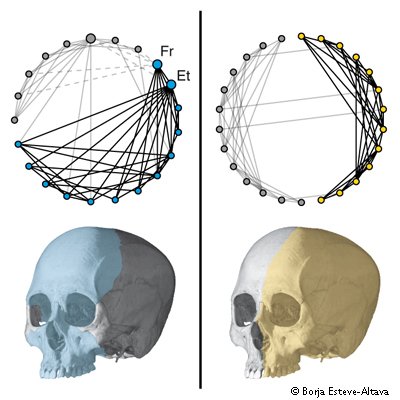
Submitted 24 April 2017 by Soledad De Esteban-Trivigno

Instructors: Dr. Diego Rasskin-Gutman (Institut Cavanilles de Biodiversitat i Biologia Evolutiva, Spain) and Dr. Borja Esteve-Altava (The Royal Veterinary College, United Kingdom).
Dates: September 18th-22nd, 2017-
Place: Centre de Restauració i Interpretació Paleontològica at Els Hostalets de Pierola (Barcelona, Spain).
Course Description:
Many features and processes of biological systems can be well represented by networks of interacting elements. In the last decades, network analysis has provided new insights into the organization and functioning of complex biological systems such as brain wiring, genetic regulation, or ecological dynamics. A basic knowledge on network modelling and network analysis will provide biologists a better understanding of cutting-edge research in their fields. This course will introduce participants into the analysis of complex biological systems using network models. Students will learn the basics of network analysis: gathering information, building network models, and interpret the outcomes of their analysis. This course combines theoretical introduction and computing practices using the free software environment R. Previous knowledge in R is not required. Participants are encouraged to bring their own data for practicing. Emphasis is placed on offering participants a wide overview of network modelling in biology and the many available software tools to do it.
Program:
Monday, September 18th, 2017. Theoretical Overview, by Dr. Diego Rasskin-Gutman. - Introductions and course overview. - Conceptual basis of networks analysis. - Types of networks. - Networks parameters. - Networks organization (small-world, scale-free, hierarchical networks). - Community detection in networks (modularity). - Getting R and RStudio ready to work.
Tuesday, September 19th, 2017. Hands on Computers I, by Dr. Borja Esteve-Altava. - The igraph package and the igraph object. - Create deterministic networks. - Create networks from data (students are welcome to bring their own data). - Manipulate network elements and attributes. - Calculate network parameters. - Identify small-world, scale-free, and hierarchical organization in networks. - Create null network models.
Wednesday, September 20th, 2017. Hands on Computers II, by Dr. Borja Esteve-Altava. - Community detection algorithms (detection, validation, and comparison). - Overview to secondary extinctions. - Overview to bipartite networks and the package bipartite. - Students project preparation.
Thursday, September 21st, 2017. Students Projects, supervised by Dr. Borja Esteve-Altava. - Student project preparation (in groups of 2-3 persons).
Friday, September 22nd, 2017. Projects Presentations and Feedback, supervised Dr. Borja Esteve-Altava. - Each team will present its work to the group for discussion and round table (15-20 min + 10 min). - Course feedback.
Copyright © 2024 American Association of Biological Anthropologists.
Site programming and administration: Ed Hagen, Department of Anthropology, Washington State University